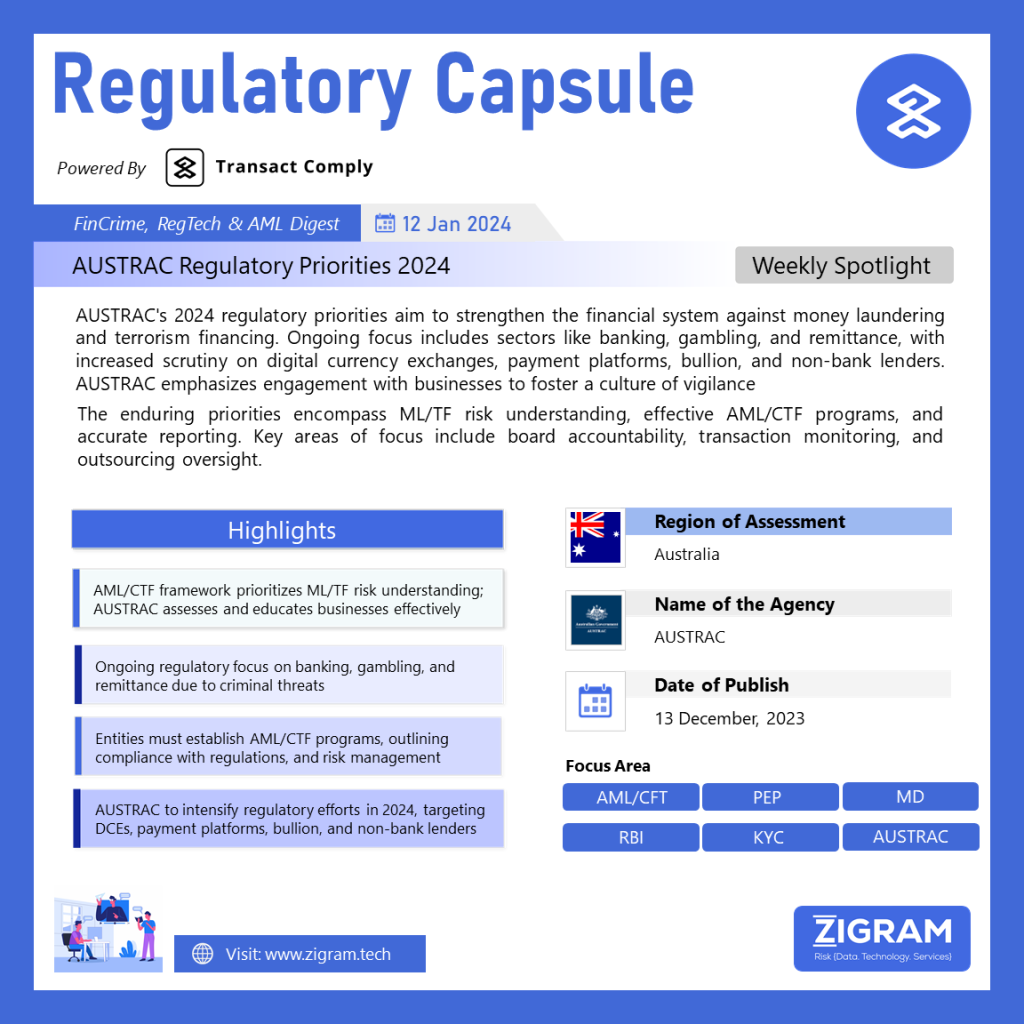Published Date:
AUSTRAC’s regulatory priorities for 2024 underscore its commitment to fortify the financial system against money laundering (ML), terrorism financing (TF), and serious crimes. The ongoing focus remains on sectors prone to higher risks, such as banking, gambling, and remittance. In addition, AUSTRAC plans to intensify efforts in sectors experiencing rapid growth: digital currency exchanges (DCEs), payment platforms, bullion, and non-bank lenders. The decision to target these sectors stems from concerns about AML/CTF compliance variations and potential risks identified by AUSTRAC intelligence and partner agencies.
The regulatory strategy involves active engagement with businesses to instill a culture of vigilance, ensuring awareness at all levels of the threat posed by financial abuse and criminal exploitation. While AUSTRAC concentrates its regulatory activities on these priorities, it retains the capability to investigate other areas crucial for AML/CTF obligations.
AUSTRAC’s regulatory work in 2024 revolves around four enduring priorities. Firstly, addressing money laundering and terrorism financing (ML/TF) risk remains paramount. This involves educating businesses on risks and evaluating the effectiveness of their ML/TF risk assessments. Secondly, ensuring reporting entities establish and maintain effective AML/CTF programs, outlining compliance with the AML/CTF Act and Rules, is a foundational aspect. These programs should detail how businesses identify, manage, and mitigate risks related to their products and services being exploited for illicit financial activities.
Thirdly, the emphasis is on accurate, timely, and high-quality reporting to AUSTRAC. International funds transfer instructions (IFTI), threshold transaction reports (TTR), and suspicious matter reports (SMR) serve as critical sources of information for AUSTRAC’s intelligence activities and collaboration with partner agencies. Lastly, high-risk sectors like banking, gambling, and remittance continue to be focal points due to their susceptibility to significant use of cash and the scale of their operations.
Beyond these enduring priorities, AUSTRAC plans to elevate regulatory activities in 2024, targeting digital currency exchanges (DCEs), payment platforms, bullion, and non-bank lenders. This decision is driven by the observed rapid growth in these sectors, concerns about AML/CTF compliance, and significant variations in compliance levels among reporting entities. AUSTRAC acknowledges the importance of addressing emerging issues promptly and intervening in cases of serious non-compliance, potentially leading to increased engagement, assessments, notifications, and enforcement actions.
In recent years, AUSTRAC’s supervision and enforcement activities have uncovered serious and systemic AML/CTF compliance failures. These failures resulted in substantial civil penalties, costly remediation efforts, and enterprise-wide capability uplift programs. Focus areas for regulatory work in 2024 include board and executive accountability for maintaining a culture of AML/CTF compliance, effective transaction monitoring programs, and proper outsourcing of AML/CTF functions.
AUSTRAC emphasizes the critical role of a positive AML/CTF compliance culture, involving engaged board members, effective governance arrangements, clear staff responsibility, and risk escalation frameworks. Transaction monitoring programs are crucial for identifying and reporting suspicious matters, informing customer due diligence, and managing ML/TF risks. Additionally, outsourcing AML/CTF functions requires thorough due diligence, ongoing oversight, and tailored programs aligned with reporting entities’ compliance obligations. AUSTRAC’s vigilance in these areas aims to prevent systemic problems, reinforce the financial system’s integrity, and combat financial crimes effectively.
- #AUSTRAC2024
- #AMLCTF
- #FinancialSecurity
- #RegulatoryPriorities
- #MoneyLaundering
- #TerrorismFinancing
- #RiskManagement
- #ComplianceCulture
- #TransactionMonitoring
- #ReportingIntegrity
- #DigitalCurrency
- #PaymentPlatforms
- #BullionRegulation
- #NonBankLenders
- #FinancialIntelligence

